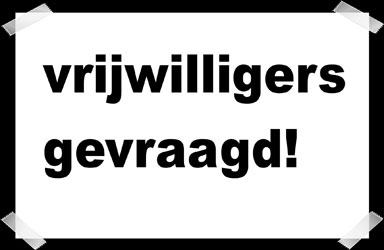In juni meldden we dat de rechtszaak door twee ME-patiënten aangespannen in Engeland, ontvankelijk verklaard werd: klik hier. Deze rechtszaak betrof een protest tegen de enge visie van de fel-bekritiseerde NICE-richtlijnen die CGT en GET als behandeling van ME/CVS naar voren schuiven en een claim voor alternatieve biomedische behandeling.
Slecht nieuws opnieuw voor de ME-patiënten gezien de uitspraak in het voordeel van NICE, wetende dat GET schadelijk is voor ME-patiënten en eerdere onderzoeken die dit ook staven. Hoewel volgens NICE goed nieuws voor ME-patiënten en over de ‘eerlijkheid’ van deze richtlijnen. Of beter gezegd: goed nieuws voor de ‘belanghebbenden’ van de NICE richtlijnen?
Website die handelt over de NICE-rechtszaak: klik hier
ME pair lose NHS treatment appeal
Bron: BBC News
Datum: 14 maart 2009
 There is some degree of controversy over how ME should be treated
There is some degree of controversy over how ME should be treated
Two ME patients have lost a High Court appeal against what they claimed was an “unfair and irrational” approach by the NHS to their condition.
The judicial review was brought by Kevin Short, from Norwich, and London-based Douglas Fraser.
They argued the NHS was wrong to place so much emphasis on psychological rather than medical therapies.
But a judge dismissed their allegations that current therapies were harmful to some with myalgic encephalomyelitis.
Lawyers for the two men had argued that guidance issued by the National Institute for Health and Clinical Excellence (NICE), restricted the range of treatment available.
Professor Peter Littlejohn, NICE’s public health director of the National Institute for Health and Clinical Excellence welcomed the decision.
He said: “We are pleased to have won convincingly on all counts in this case – this judgment is a welcome endorsement of the rigorous methods we use to produce our guidelines.
“This result is very good news for the thousands of people with ME, who can continue to benefit from evidence-based diagnosis, management and care for this disabling condition.”
We’re delighted that this issue is now closed
Professor Peter Littlejohns, NICE
The guidance issued in August 2007 related to ME and chronic fatigue syndrome, which affect over 200,000 across the country.
Experts are divided over the severity and best way to treat the conditions – and whether they are indeed two separate illnesses.
NICE recommends cognitive behavioural therapy (CBT), a form of counselling, and planned activity programme known as graded exercise therapy (GET) as front-line treatments.
But the two men told the High Court that such therapies can actually be harmful to people with ME in particular.
They said there should be more emphasis placed on drug treatments, arguing ME can lead to cardio-vascular problems and severe joint pain.
Professor Littlejohns said: “The judgment acknowledges the robust procedures that NICE follows in ensuring that its guidance is independent, evidence-based and fit for purpose.
“We’re delighted that this issue is now closed.”
Norwich man loses ME court fight
Bron: Evening News 24
Datum: 13 maart 2009
A graduate from Norwich and his fellow ME sufferer have lost their battle for different types of medical treatment to be available on the NHS.
Kevin Short, 47, a former engineer from Norwich, has had his complaints dismissed as misconceived by a High Court judge. He was fighting alongside Douglas Fraser, a former professional concert pianist, from London.
Mr Short has had myalgic encephalomyelitis, or ME, since the 1980s and has problems with mobility. He has been campaigning for years to end the misconception that it is “yuppie flu”, and says that it is a physical not a psychological condition.
Mr Short and Mr Fraser had argued that the National Institute for Health and Clinical Excellence (Nice) had made “irrational and perverse” restrictions on treatments available for ME sufferers. It recommends cognitive behaviour therapy and graded exercise treatment for those with mild to moderate forms of the illness, which some sufferers say makes them worse. They want to see alternatives such as adrenal support supplements, antiviral treatment, diet modulation and vitamin and mineral supplements.
But today the judge rejected argument on behalf of two victims of the debilitating illness that decisions made by a panel of experts were tainted by bias or the appearance of bias.
In a strongly-worded postscript to his judgment, Mr Justice Simon said the allegations made against panel members were not only damaging to them but “may cause health professionals to hesitate before they involve themselves in this area of medicine”.
He said: “A perception that this is an area of medicine where contrary views are not to be voiced, and where scientific inquiry is to be limited, is damaging to science and harmful to patients.”
Such allegations might deter people from serving on the Guideline Development Group, the panel which reports to Nice, he said.
A spokesman for the ME Association said: “People with ME and chronic fatigue syndrome now face a situation where doctors will continue to recommend two forms of treatments that many people with the illness find ineffective or even harmful.
“The ME Association believe that the two people with ME who took up the legal challenge were fully justified in seeking a court hearing into the processes used by NICE to draw up the guideline…We shall continue to ask NICE to review the contents of what we maintain is a seriously flawed and unhelpful guideline.”







